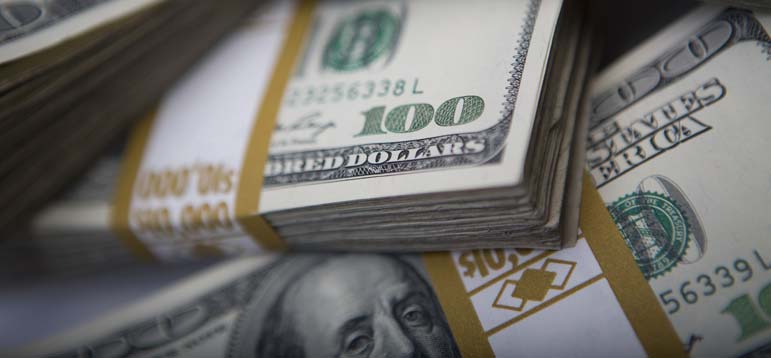
When Congress recently approved a new stimulus package, it included $600 cash payments to Americans. But that struck many people as a measly gesture compared to the $1,200 checks issued in the previous stimulus, and considering the economic damage done by the pandemic over the nine months since the Cares Act. So when President Donald Trump called for $2,000 checks, Democrats immediately jumped on board and some Republicans followed.
The new $2,000 amount was approved in the House on Monday, though a vote in the Senate Tuesday was blocked by Majority Leader Mitch McConnell. The proposal is still very much alive, garnering support from both GOP Senate incumbents David Perdue and Kelly Loeffler, who face a runoff election on Jan. 5 in Georgia. Given the controversy, it's worth asking how much the larger amount will actually help the economy.
I'll start with the positives. Most of the unemployment benefits passed in the Cares Act expired at the end of July, and because of archaic unemployment systems in states, many eligible workers never got them. These individuals have gone months wondering if or when more fiscal relief would come, and when we'll get the kind of economic reopening that will bring back millions of jobs in industries like travel and dining. The fiscal relief package just passed by Congress will reinstate those unemployment benefits for a while, but at a reduced level. For everyone that falls into these buckets, an additional $1,400 payment is an efficient way to provide additional relief without relying on state unemployment systems to process claims on time, and to make up for Congress letting relief lapse over the summer.
And checks are broadly popular with the public. According to Data for Progress, 78% of Americans support the $2,000 payments. There's something to be said for giving the people what they want in a high-profile way. It makes them feel like the system is working for them and builds trust for the future. Arguably, it was the success of the $1,200 checks in the Cares Act that bought the political will for another round of fiscal relief this month.
Those positives dwarf the negatives associated with the checks. From a macroeconomic or distributional standpoint it would be better to tailor relief more to where it's most needed — unemployed workers, or certain hard-hit state and local governments that continue to have big revenue shortfalls. But those options lack the political momentum that the $2,000 checks have. And a larger cash payment will still benefit these groups — for instance, money spent by individuals will be taxable, indirectly benefiting state and local budgets.
The bigger checks might be wasted on some recipients who don't need the money — but not entirely. Any two-person households making $150,000 that receive the additional payments might just stick it into savings. Or maybe they'll spend it on a Playstation 5 or a new set of AirPods Max.
Individuals with an impulse for gambling might use the money to buy speculative stocks or bitcoin. That could add some froth to the financial markets, but that's not particularly harmful to the economy, either. With inflation and interest rates as low as they are, a little excess consumption of trendy gadgets or risky stock bets isn't going to lead to any kind of economic overheating.
The bottom line is that checks are popular with the public, easy to deliver, will help the fortunes of those who are struggling, and don't pose a near-term inflationary risk to the economy. Congress should go ahead and send 'em.
(COMMENT, BELOW)
Previously:
• 08/24/20 Young people can't buy homes until older owners . . . move on
• 08/18/20 Our pandemic love affair with e-commerce could soon sour
• 08/10/20 Booming 'zoom towns' should ease city housing costs
• 07/11/20 With a Biden economy, will America be condemned to relive the '70s?
• 07/14/20 Renting and homebuying swap roles in the covid-19 market
• 07/13/20 Markets may have a reason to rise along with covid-19 cases
• 04/27/20 U.S. economy may have hit the coronavirus bottom
• 11/12/19 The 2020 economy should feel a lot better: What to, realistically, expect
• 04/23/19: Gen Z is likely to temper aging socialist millennials
• 03/25/19: All signs point to a housing boom ahead
• 02/19/19: Trump's economic gamble might make sense
• 02/15/19: Scaring off Amazon will backfire for the Left
• 01/29/19: The 2020 election will shred the Obama coalition
• 11/15/18: Amazon proving the 'rich get richer'?
• 11/13/18: How gerrymandering can reduce the partisan divide
• 10/22/18: The politics of the next recession will be a disaster
• 08/02/18: The future of the US looks a lot like ...
• 05/05/18: Brick-and-mortar stores may start to make sense again
• 05/05/18: College admissions season is about to get much easier
• 05/03/18: Changing housing needs of millennials will change economic development
• 02/13/18: The big idea for Middle America is to think small
• 02/07/18: Dems are caught in a tax bill trap this year
• 10/25/17: Good times have come to Trump-leaning states
Sen is a portfolio manager for New River Investments in Atlanta and has been a contributor to the Atlantic and Business Insider.


 Contact The Editor
Contact The Editor
 Articles By This Author
Articles By This Author